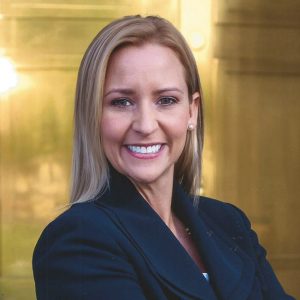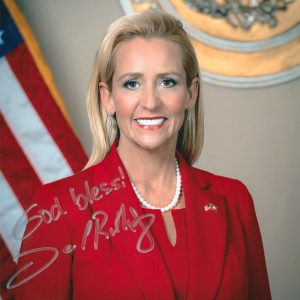calsfoundation@cals.org
Leslie Carol Rutledge (1976–)
Leslie Rutledge is a lawyer and government official who rose to prominence in the Arkansas Republican and legal communities in the early 2010s. A conservative Republican, she was elected state attorney general in 2014 and quickly became an active participant in the ongoing culture wars that, among other things, focused on denying marriage rights to same-sex couples. In 2022, she became the first woman elected lieutenant governor of Arkansas.
Leslie Carol Rutledge was born on June 9, 1976, in Batesville (Independence County) to Nancy Rutledge and Keith Rutledge. She grew up in Batesville and graduated from Southside High School in 1994. She then studied at the University of Arkansas (UA) in Fayetteville (Washington County), where she majored in English, receiving her undergraduate degree in 1998. She earned her law degree at the University of Arkansas at Little Rock William H. Bowen School of Law in 2001.
Following her graduation from law school, Rutledge clerked for Arkansas Court of Appeals (and later Arkansas Supreme Court) justice Josephine Hart from 2001 to 2004. She continued her public career serving as deputy counsel in the office of Governor Mike Huckabee.
Rutledge would follow that job with a series of political and governmental positions, beginning with deputy prosecuting attorney in Lonoke County, where she handled felony cases from 2005 to 2006. She went on to serve as an attorney for Arkansas’s Division of Children and Family Services, as well as an attorney in the Arkansas Department of Human Services, a stint whose end remains a matter of some dispute. Personnel files later released under a court order asserted that she was fired, apparently with a “Do not rehire” note in the file, but Rutledge maintains that she resigned to join an ongoing political campaign.
In 2007, she joined Huckabee’s campaign for president as deputy legal counsel before becoming deputy legal counsel for the National Republican Congressional Committee, where she served from 2008 to 2009. She served as counsel to the Republican National Committee from 2010 to 2013. Returning to Arkansas in 2013, she began private practice with the Rutledge Firm and prepared to run for state attorney general.
In December 2015, Rutledge married Boyce Johnson, a farmer she had met at a convention of the American Farm Bureau Federation. The couple has a daughter.
In a race for an office made open due to term limits, Rutledge ran a strong campaign, although some mid-campaign controversy over whether she was registered to vote in Arkansas or Washington DC led her to have to reregister in Arkansas. Drawing upon her longtime party and legal ties, she emerged the clear leader in the three-candidate Republican primary. Although she failed to get the fifty percent necessary to avoid a run-off, in the subsequent runoff election she garnered just under fifty-nine percent to defeat fellow Little Rock (Pulaski County) attorney David Sterling. Then, in November’s general election, Rutledge won with 51.6 percent for an eight-point victory over Democrat Nate Steel, with Libertarian Aaron Cash taking five percent. In 2018, she won reelection with 61.8 percent.
As attorney general, Rutledge began pursuing a wide-ranging and clearly conservative agenda. In 2016, she announced her intention to appeal a ruling supporting anti-discrimination laws that had been enacted in Fayetteville in opposition to a state law prohibiting these ordinances. Too, she defended Arkansas’s prohibition on gay marriage, an issue that was in the process of being litigated when the U.S. Supreme Court rendered the issue moot with its decision in Obergefell v. Hodges.
The year 2017 was a busy one for Rutledge. Beginning in June, she dragged her feet after the Court’s follow-up ruling concerning the state’s refusal to include both parents of a married gay couple on the child’s birth certificate. The case, Pavan v. Smith, had its roots in Arkansas, and Rutledge not only expressed her belief that the decision was wrong but tried to stall its implementation, only beginning in December to work with Arkansas Department of Health officials to craft the necessary changes after Governor Asa Hutchinson intervened. Meanwhile, in July 2017, Rutledge joined Texas’s attorney general Ken Paxton and a group of Republican attorneys general in threatening the administration of President Donald Trump, saying they would go to court if the administration did not terminate the Deferred Action for Childhood Arrivals (DACA) policy that had been put into place by President Barack Obama. Also in 2017, Rutledge again rejected a proposed state constitutional amendment to legalize casino gambling in the state.
In an effort to enhance citizens’ awareness of what the attorney general’s office does and how it can affect the lives of Arkansans across the state, Rutledge began hosting yearly “Rutledge Roundtables” with citizens from all seventy-five counties. She also created mobile offices that operate in each county and established a Public Integrity Division, in addition to a Military and Veterans Initiative and a Cooperative Disability Investigations program.
Actively involved in national legal organizations, she has served as the co-chair of the National Association of Attorneys General Committee on Agriculture, chair of the National Association of Attorneys General-Southern Region, and chair of the Republican Attorneys General Association. She is also a member of the Arkansas Bar Association, the Federalist Society, the National Rifle Association, and the Republican National Lawyers Association.
With term limits precluding her from serving another term as attorney general, on July 1, 2020, Rutledge announced her candidacy for governor. Calling herself a defender of the Second Amendment, religious freedom, and pro-life values, she promised to make the protection and advancement of these principles the centerpiece of her campaign to become the state’s first woman to serve as chief executive. Sarah Huckabee Sanders, former press secretary to Donald Trump and daughter of former Arkansas governor Mike Huckabee, proved Rutledge’s greatest roadblock, and after lackluster fundraising, Rutledge shifted to campaigning for lieutenant governor, winning the Republican primary on May 24, 2022, and the general election on November 8, 2022.
Rutledge also allegedly had ties to groups associated with the January 6, 2021, insurrection at the U.S. Capitol, although on January 7 she did issue a broad statement assailing the “violence and destruction” and asserting: “We are a nation of laws.” In addition, she has come under fire for using state funds to join out-of-state lawsuits that have sought to further the conservative Republican agenda but have had little to do with Arkansas. The courts have allowed lawsuits against her for this practice to proceed, with the controversy serving as a distraction from her ongoing gubernatorial campaign efforts. She has also been a defender of Act 1002 of 2021, which prohibits municipalities from issuing mask mandates during the continuing COVID-19 pandemic, and has vowed to defend the law against the court challenges that have emerged.
For additional information:
“Leslie Rutledge.” Ballotpedia. https://ballotpedia.org/Leslie_Rutledge (accessed June 22, 2023).
“Leslie Rutledge for Governor—Make Arkansas First.” https://leslierutledge.com/ (accessed June 22, 2023).
William H. Pruden III
Ravenscroft School








Comments
No comments on this entry yet.